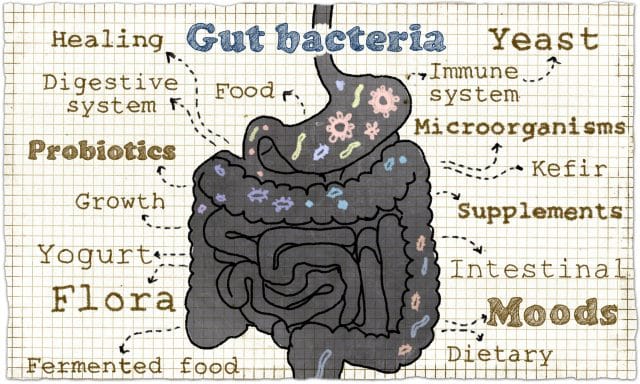 Bacteria. Most people associate the word with negative outcomes like viruses and infections. But many don’t realize that we actually need certain kinds of healthy bacteria in order to help our immune systems thrive. We all have billions of this bacteria living inside of us – it’s part of what contributes to the human microbiome, an internal community of microorganisms that has the potential to both help us and harm us.
Bacteria. Most people associate the word with negative outcomes like viruses and infections. But many don’t realize that we actually need certain kinds of healthy bacteria in order to help our immune systems thrive. We all have billions of this bacteria living inside of us – it’s part of what contributes to the human microbiome, an internal community of microorganisms that has the potential to both help us and harm us.
Some of the microbes found in the microbiome are healthy — they’re called symbiotic microbiota, and they benefit the human body. Other kinds of microbes are not healthy — they’re called pathogenic microbes, and they can cause diseases. Typically, symbiotic and pathogenic microbes can exist together without wreaking any havoc on the body. But if the microbiome is damaged from disease, an unhealthy diet, or excessive antibiotic use, the microbes in the gut become unbalanced, with more pathogenic microbes than symbiotic. This unbalanced microbiome causes the body to become more susceptible to disease.
This is why it’s imperative to support your microbiome. As Hippocrates once said, “All disease begins in the gut.” So how can you nurture your gut health? The easiest way is by changing your diet.
Foods to Eliminate
 It’s important to avoid foods to that promote inflammation in your body. Eliminate the following foods to help support your microbiome:
It’s important to avoid foods to that promote inflammation in your body. Eliminate the following foods to help support your microbiome:
-Refined vegetable oils (canola, corn, and soybean oils)
-Pasteurized dairy products
-Refined carbohydrates and processed grains
-Non-organic meat, poultry and eggs
-Processed sugars (present in most processed and packaged foods, such as cookies, crackers, canned foods, cereals, and breads)
-Trans fats and hydrogenated fats (found in most processed and packaged foods, and also used in deep fried foods)
Foods to Incorporate
 While avoiding foods that cause inflammation is a great way to boost your gut health, it’s just as important to add foods to your diet that reduce inflammation. Foods that are high in antioxidants are great at reversing damage in your gut. Add the following foods to your diet to keep your microbiome functioning at its best:
While avoiding foods that cause inflammation is a great way to boost your gut health, it’s just as important to add foods to your diet that reduce inflammation. Foods that are high in antioxidants are great at reversing damage in your gut. Add the following foods to your diet to keep your microbiome functioning at its best:
-Fresh vegetables (Make sure to incorporate a wide variety, and try to consume four to five servings each day. Good choices include carrots, broccoli, cabbage, cauliflower, leafy greens, beets, onions, and squashes)
-Fresh fruits (Not fruit juice! Aim for three to four servings each day. Good choices include apples, berries, nectarines, peaches, grapefruit, pears, cherries, pomegranates, and oranges)
-Herbs, spices, and teas (Turmeric, ginger, oregano, green tea)
– Probiotics (Foods that provide your body with “good bacteria:” yogurt, Kombucha, fermented food, and kefir. You can also add a good-quality probiotic supplement to your daily regimen)
-Wild-caught fish, organic, cage-free eggs, and organic, farm-raised foods.
– Healthy fats (grass-fed butter, avocado oil, coconut oil, extra virgin olive oil, nuts and seeds)
-Ancient grains, legumes, and beans (Sprouted is best! Make sure they are unrefined and whole grains. Aim for two to three servings daily. Good choices include black beans, chickpeas, lentils, quinoa, amaranth, buckwheat, and black-eyed peas.)
-Red wine and dark chocolate (Consume these in moderation. Aim for a few times a week. Cacao nibs or powder are especially nutritious.)
A few other ways you can support your microbiome are by avoiding antibiotics as much as you can, exercising more, lowering your stress levels, and incorporating supplements like
CoQ10, omega-3 fish oil, selenium, and vitamins C, D, and E.
Keeping your gut health in check will not only help you to feel healthier and more energized on a daily basis, but will
also keep problems such as autoimmune diseases, brain disorders, mood disorders, infertility, allergies, asthma, and even cancer, at bay.


























